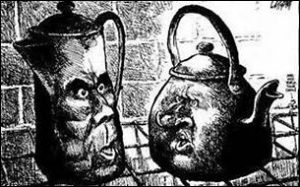 Michael Bills, a former Goldman Sachs executive and chief investment officer of the University of Virginia, is so outraged by what he calls the “legalized corruption” of Dominion Energy’s outsized campaign contributions that he says he’ll donate thousands of dollars to legislators who pledge not to accept money from the power company and to divest any personal investments in the company.
Michael Bills, a former Goldman Sachs executive and chief investment officer of the University of Virginia, is so outraged by what he calls the “legalized corruption” of Dominion Energy’s outsized campaign contributions that he says he’ll donate thousands of dollars to legislators who pledge not to accept money from the power company and to divest any personal investments in the company.
The Clean Virginia Project will offer $5,000 per election cycle to participating delegates and $20,000 per cycle to senators, reports the Richmond Times-Dispatch. “Democrats and Republicans should represent their constituents and not powerful corporate interests, and Clean Virginia will be holding them accountable if they don’t,” Bills said in a prepared statement.
That’s really rich coming from a guy who made $1,344,500 in Virginia political contributions in 2017 — compared to $913,646 for Dominion.
Puh-leeease. If Bills and his buddies in the Charlottesville gentry want to criticize the legislation working its way through the General Assembly, I’m fine with that. There are a lot of pros and cons to most recent version of the bill that would rewrite the process for regulating electric utilities in Virginia. Does it lock in utility profits at an unacceptably high level? Does it undermine the State Corporation Commission’s powers of regulatory oversight? What form should electric grid modernization take? Those are all legitimate questions that would benefit from a robust public discourse.
But when it comes to criticizing Dominion for contribution to political campaigns, Bills sounds like the pot calling the kettle black. Spare me the insufferable self-righteousness.
When “Dominion” makes political contributions, the money isn’t coming from rate payers or even shareholders. The money is collected from Dominion executives and employees. If I understand the mechanics correctly, the Dominion political action committee aggregates the donations of individual employees, some of whom are wealthy executives and some of whom are every-day employees. Somehow, we’re expected to believe that Bills’ donating more than a million dollars from his massive personal wealth is less “corrupt” than hundreds of Dominion employees pooling their smaller donations.
Last year, Bills donated $416,000 to the Northam for Governor campaign. Dominion donated $50,000 — which it offset by donating $55,000 to the Gillespie campaign. If money corrupts the political process, one would think that Bills sank his talons far deeper into Northam than Dominion did. Yet Northam helped work out the legislative compromise with Dominion that Bills’ friends at the Clean Virginia Project find so objectionable. What happened? Is Bills upset that he bought Northam but he didn’t stay bought?
Clearly, money talks. If it didn’t, special interests wouldn’t dole out so much of it. But it’s not so clear that money buys much more than access — the right to be heard– as opposed to a politician’s undying fealty.
The irony is that in the past year or two, Charlottesville’s landed gentry has emerged as a much bigger source of political contributions than Dominion could dream of becoming. Just look at all the money donated to left-wing populist Tom Perriello last year. At least the Dominion PAC represents the interests of thousands of employees around the state. Who does Bills represent other than himself?


